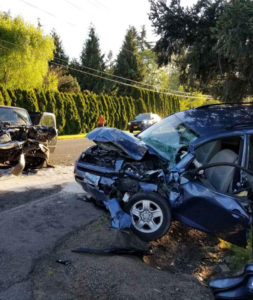Florida District Court of Appeal Reviews Evidence Presented for Compensatory Damages Portion of Car Accident Case

Florida car accident trials can become intricate, complicated lawsuits to litigate. This can be seen in a recent appellate case (No. 3D13-2005) that addresses whether or not it was improper for the trial court to allow evidence of the at-fault driver’s intoxication during the compensatory damages phase of the trial. The case stems from a serious car accident in which the injured party was struck head-on by an intoxicated, uninsured motorist. The injured person’s UM policy only covered up to $20,000 per person. The injured person filed suit against the insurer for its failure to pay the uninsured motorist coverage, alongside a claim for compensatory and punitive damages against the defendant driver.
Prior to trial, both the driver and the insurance company admitted liability for the accident, and they admitted that under the law, the driver was liable for punitive damages for his actions, since he was under the influence of alcohol when he was driving. With the question of liability settled, the remaining issues were the amounts of compensatory and punitive damages to be awarded to the injured person. Compensatory damages cover costs that the injured person incurred after the accident. These can also include future damages that are reasonably certain to occur. Punitive damages are exactly as they sound, damages intended to punish the party for egregious behavior.
The insurer moved to bifurcate, or separate, each type of issue. The insurer also moved to exclude references to the driver’s intoxication during the first trial over the compensatory damages. The court granted the first motion but denied the second, and this denial formed the basis of the insurer’s appeal. The insurer argued that the driver’s intoxication became a central theme of the first trial, and the insurer was prejudiced as a result. The injured person presented proof of his damages. He acknowledged a prior back pain condition that led to spinal surgery, and he admitted that he went a long time without medication. The injured person also acknowledged that he became addicted to painkillers after he was prescribed some after the accident. The injured person stated that he now takes suboxone to wean himself away from Oxycontin and that it costs around $560 a month. The injured person also discussed his future earning capacity, saying that he retired right before the accident, accepting a retirement package, but he also supplemented his income by working in the diving industry, earning $2,000 to $2,500 a month. The jury found for the injured person, awarding him over $970,000 in compensatory damages, including over $300,000 for future medical expenses and loss of future earning capacity.
The appellate court agreed with the insurer that it was correct to bifurcate the damages issues but improper to allow the evidence of the defendant’s intoxication at the time of the accident. The court cited Florida state case law that considers evidence of the defendant’s sobriety as irrelevant and prejudicial when she or he admits liability regarding the cause of the accident. The court also felt that the evidence of the injured person’s future earning capacity fell short of the legal requirement for an award. Under Florida law, the injured person must show the need for future medical treatment with a reasonable degree of certainty. A possibility of treatment is not enough. The court reversed the rulings of the trial court and remanded the case for a new trial.
A Florida car accident attorney at Weston & Pape can aggressively pursue all avenues of legal relief to seek the damages you deserve. Call our office today at 722-266-5555 or 561-299-3999 for a free, confidential consultation.

 Call Us Today
- It's Free
Call Us Today
- It's Free